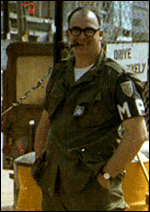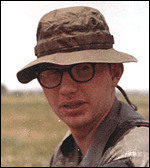June There was a relocation of Military Police (MP) assets to Can Tho. We knew before hand this was going to occur because we had to make room in our billets for a lot of new people.
22 June (on or about) All of Military Region IV (IV Corps Tactical Zone) was placed off limits to all U.S. military personnel on pass and they were all now restricted to their installations, unless on combat operations or orders for other travel. No "passes" were authorized.
Day 1, Comprehensive Anti Drug Enforcement Campaign (From a conversation I had with SP/4 Rudolph "Rudy" Ferdinand about 6 years ago). SP/4 Ferdinand and I were assigned to a motor patrol together. There were now so many MP's in the Can Tho Detachment that for the first time we had designated patrol area's. Rudy and I had the area to the south of the MP compound. It included some bars but was mainly a residential area. We picked up GI's buy the truckload on the first day. As I recall on Day 1 all the people that were picked up were returned to their units and not charged with anything unless it was a drug possession violation.
Day 2 Rudy and I again worked together. This was good for both of us because we knew each other and were comfortable working together. The MP's who had recently been assigned to us did not know us or the city so I was glad to be with someone from Can Tho. The second day was pretty much a repeat of the first with three exceptions: There were many less GI's in town; Most of those we caught this day went to the detoxification center not their units; and, that evening there were civil disturbances at the Can Tho Army Airfield and Binh Thuy Air Force Base. The U.S. soldiers who had been trapped on the bases and were drug users, wanted off base to resupply, they were beginning to suffer from withdraw. I worked the reaction force to Binh Thuy. We went there to basically block the gates. Fortunately we did not have any serious problems. There was also a separate reaction force for the Can Tho Army Airfield. As I recall CPT Kenneth Pillsbury commanded both forces. We were called out numerous times during the drug crackdown operation.
Day 3 Was similar to day 2.
Day 4, and until the end of the Anti Drug Enforcement Campaign A serious effort was made to raid the local drug supply network and find the many U.S. military deserters living in the area. This was the beginning of identifying a lot of long term deserters.
There were combined Vietnamese/American drug raids at the time. Some of them were commanded by a U.S. Army Captain who was an adviser to the Canh Sat's (Vietnamese National Police). The Captain wore the brown camouflage uniform normally worn by their field forces and was fluent in Vietnamese. He had been around Can Tho for a long time and was not one of the "new people". However, I do not recall his name. I worked a number of raids with him and his force. One raid in particular that took place in downtown Can Tho stands out. There were about four MP's assigned to the raid team with a very large Canh Sat force, maybe 20 or so. As we approached the location the Canh Sat's refused to proceed any further and left us there alone. It was the only time I had ever seen them openly balk at their job.
The number of long term deserters we encountered at this time was very surprising. The local Vietnamese town folks began to tell us where the deserters were staying and we started to pick them up. The detachment MP's had a pool going and kept track of who caught the deserter who had been out the longest. I don't remember who won but Rudy and I got a guy who had been a deserter almost 4 years and we didn’t!
We worked extremely long hours during this time and I remember the last night pretty well. Can Tho was like a "Ghost Town" and several of us, including SSG Murray, were standing at the MP Compound gate talking when SFC Boggs came up to me and wanted to know if I knew where he could get something to eat.
I remember walking down the street to get him a sandwich very late that night and when I returned some of the "New M's" told me they thought I had been there too long, because I went by myself with only my 45 and shotgun. SSG Murray laughed at them and told them they had no idea. (I had been in Can Tho 11 months, I was 21 years old). |


